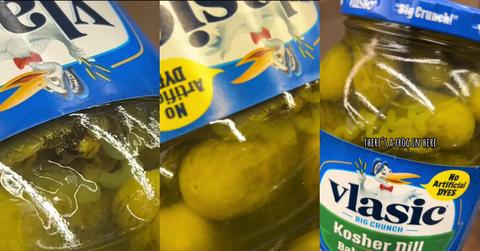“That’s a F---ing Frog!” — Woman Finds Amphibian Inside a Vlasic Pickle Jar
"Call corporate and make a big Dill about it."
Published Dec. 6 2024, 9:57 a.m. ET

If you scroll enough through TikTok, it won't take you long to realize it contains a little bit of content for everyone. Sure, you've got your fair share of vapid, genetically gifted people performing mirthless lip-syncs that function as miniature eulogies for anyone unfortunate to not be as screen-attractive as they are.
But the app's also filled with comedy, and some helpful advice, as well as fails and gross-out videos. Recently, a user named Cole (@coleycake) contributed to the latter category with a video that has hit the 7 million view mark. Titled "Soooooo is this a new flavor???" the clip zooms in on a jar of Vlasic pickles containing what Cole suspects is … a frog.
As she rotates the jar for a closer look, she repeatedly exclaims in shock, "There's a frog in here." Then, later with more certainty, "That's a f---ing frog." While the object in question appears un-pickle-like, its identity remains to be conclusive. The ambiguity, however, didn't deter commenters from making some cringe-worthy puns.
The first pun hit us with, "That is toadally unacceptable! I would have croaked." Another added, "I hopped right to the comments," and a third fancied themselves with a zinger, "Excuse me? This is ribbiting." One might say that for a platform dominated by Gen Z and Gen Alpha, these comments all sounded like they were lifted straight out of a boomer joke book you'd find at the bargain bin in Barnes & Noble.
However, another commenter saw dollar signs, "Best $6 lawsuit ever buy it."
And if you are the litigious type, then you'll be happy to know that historically, incidents of finding foreign objects in food have led to various lawsuits. Whether it’s finding bugs in broccoli or a frog in boxed lettuce, these incidents happen more regularly than we might imagine.
And thanks to the internet, it’s just not fodder for friends and family — it’s now a moment for potential virality. And also — the possibility of a lawsuit.
As an example, in 2024, Boar's Head faced multiple lawsuits after a listeria outbreak linked to their deli meats resulted in nine deaths and 58 illnesses across 18 states.

These included claims of personal injuries, wrongful death, and deceptive marketing with payouts ranging from $25,000 to over $5 million.
The compensation for discovering foreign objects (like frogs) in food varies based on things like the severity of harm and the strength of evidence.
In cases where a foreign object causes injury or illness, victims may receive compensation for medical expenses, lost wages, and pain and suffering … dependent on specifics.
However, if no physical harm occurs, obtaining significant compensation can prove very difficult. Courts typically require proof of negligence and actual damages.
Therefore, simply finding a foreign object without suffering any real will probably not lead to meaningful compensation.

“But, your honor, I saw the frog in my pickles,” might not hold up in court.
Legal disputes aside, there's another point to consider in the wake of this briney, amphibious find: why are so many of our species captivated by gross stuff?
Human fascination with the gross and disgusting has a clear psychological explanation. When it comes to evolution, disgust functions as part of our survival mechanism. Essentially, it's self-preservation. “If it smells bad, throw it out,” kind of sums up the concept ... but maybe you'll want to just take one more whiff. “If it looks gross, don’t eat it,” is also intuitive.
Our aversions to the nasty and skanktastic is the next door neighbor of curiosity. Seven million views on a “gross video” allows folks to experience controlled disgust, providing a safe entertainment experience. You know, without having to encounter it IRL, of course.

This "I wanna look but never touch" dynamic can probably be likened to people's love for horror films, as they offer a way to audiences to “confront” their fears in a safe environment. This could be the reason why a movie like Terrifier 3 has made $88.7 million worldwide, as of this writing.
While finding something gross in your food may lead to possible legal action, again, you need to prove harm was caused and have the evidence to prove it. What’s more, is that our obsession with the stuff speaks to the human condition. Ultimately disgust protects us, but it also fuels primal curiosity.
We’re wired by Mother Nature to lean in, share, and uncomfortably laugh throughout the ick. Whether it’s a frog in a pickle jar or one of countless viral gross-out moments, we can’t help but turn revulsion into camaraderie — like, “Yo! This is so nasty you have to see this!” That’s about as human as it gets.